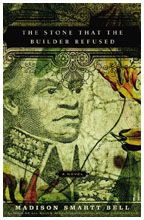Have an opinion about this issue of PAW? Please take a minute to click here and fill out our online questionnaire. It’s an easy way to let the editors know what you like and dislike, and how you think PAW might do better. (All responses will be kept anonymous.) |
April 6, 2005: Reading Room
In the last novel of a trilogy, Madison Smartt Bell ’79 focuses on Toussaint Louverture, who led Haiti’s slave revolt. (Jerome de Perlinghi) |
From
slavery to freedom
Madison Smartt Bell ’79 chronicles Haiti’s bloody
revolution
By David Galef ’81
About 20 years ago, Madison Smartt Bell ’79 got the idea for a fictional account of Haiti’s long, bloody struggle for independence, which had started in the late 1790s and was led by the powerful and enigmatic Toussaint Louverture. The rebellion was the only successful slave revolution in history.
“Toussaint Louverture’s remarkable trajectory, from slavery to defeating several great powers of Europe both in battle and in politics, is what interested me first,” says Bell. “A bit later it struck me ... that of the three great revolutions of the era, only the Haitian Revolution put its money where its mouth was and extended the human rights announced by the American and French Revolutions to all people, not just white people.”
 The subject
matter was a departure for Bell, who had established a reputation for
tough urban fiction like Waiting for the End of the World (1985).
His project on Haiti eventually amassed some 2,000 pages in three novels
spanning 30 years of racial warfare and 18th-century global politics.
The final book of the series, The Stone That the Builder Refused,
was published last fall by Pantheon.
The subject
matter was a departure for Bell, who had established a reputation for
tough urban fiction like Waiting for the End of the World (1985).
His project on Haiti eventually amassed some 2,000 pages in three novels
spanning 30 years of racial warfare and 18th-century global politics.
The final book of the series, The Stone That the Builder Refused,
was published last fall by Pantheon.
The first volume in the trilogy, All Souls’ Rising (1995), detailed the origins of the Haitian uprising as a slave revolt against the French, costing thousands of lives on both sides. At that time, Haiti was still the French colony known as Saint-Domingue. The second volume, Master of the Crossroads (2000), described how Louverture outmaneuvered the Spanish and English forces. The Stone That the Builder Refused concerns the last days of Louverture, finally captured by the French, and the plight of the Haitian insurgency after Napoleon reneged on his promise of support for the rebels and sent troops to attack them. It continues with characters from the earlier two volumes, among them Antoine Hébert, a European doctor sympathetic to the revolutionaries; and the shadowy rebel fighter Riau. Far more than a chronicle of battles, the trilogy describes relationships and their sundering of master and slave, soldier and commander, and husband and wife. “The revolution,” says Bell, “was about who gets to have human rights — who gets to be defined as human.”
At the outset, Bell didn’t realize how massive the project would become. He pored over historical records and learned Creole. Since 1995, he has visited Haiti about a dozen times.
Bell had begun writing fiction before arriving at Princeton, and in his sophomore year took a writing workshop with poet and novelist George Garrett ’52 *85, whom he credits as a major influence. A creative writing professor at Goucher College in Baltimore since 1984, Bell is the author of nine other novels, including his powerful debut The Washington Square Ensemble (1983), and the short-story collections Zero Db (1987) and Barking Man (1990).
For his next project, Bell is finishing up a brief biography of Louverture
in Paris. And then? After spending almost two decades on Haiti, he’s
ready to move on. “I hate repeating myself,” he says. ![]()
David Galef ’81 is a novelist and an English professor at the University of Mississippi.
BOOK SHORTS
 Live Longer,
Live Better: Taking Care of Your Health After 50 — Peter
H. Gott ’57 *58 (Quill Driver Books). The author, an internist,
addresses common medical and health issues — from managing chronic
pain and a new therapy for rheumatoid arthritis to treatment for prostate
cancer and the warning signs of strokes — in a user-friendly, question-and-answer
format. Gott writes a nationally syndicated column, “Dr. Gott.”
Live Longer,
Live Better: Taking Care of Your Health After 50 — Peter
H. Gott ’57 *58 (Quill Driver Books). The author, an internist,
addresses common medical and health issues — from managing chronic
pain and a new therapy for rheumatoid arthritis to treatment for prostate
cancer and the warning signs of strokes — in a user-friendly, question-and-answer
format. Gott writes a nationally syndicated column, “Dr. Gott.”
 Extremely
Loud and Incredibly Close — Jonathan Safran Foer ’99
(Houghton Mifflin). This novel opens as 9-year-old Oskar Schell returns
to his apartment on the morning of Sept. 11 and listens to five messages
from his father, who is trapped in the World Trade Center. The novel follows
the boy as he searches for the lock that fits a mysterious key belonging
to his dead father. Foer also wrote Everything is Illuminated
(2002), which was made into a movie to be released in August.
Extremely
Loud and Incredibly Close — Jonathan Safran Foer ’99
(Houghton Mifflin). This novel opens as 9-year-old Oskar Schell returns
to his apartment on the morning of Sept. 11 and listens to five messages
from his father, who is trapped in the World Trade Center. The novel follows
the boy as he searches for the lock that fits a mysterious key belonging
to his dead father. Foer also wrote Everything is Illuminated
(2002), which was made into a movie to be released in August.
 Bloody
Falls of the Coppermine: Madness, Murder, and the Collision of Cultures
in the Arctic, 1913 — McKay Jenkins *96 (Random House).
The author tells the story of the brutal murder of two Catholic priests
who set out in 1913 on a dangerous journey to convert a group of Eskimos
and were killed by Inuit hunters. Jenkins recounts the police investigation
and murder trials. Jenkins is an English professor at the University of
Delaware.
Bloody
Falls of the Coppermine: Madness, Murder, and the Collision of Cultures
in the Arctic, 1913 — McKay Jenkins *96 (Random House).
The author tells the story of the brutal murder of two Catholic priests
who set out in 1913 on a dangerous journey to convert a group of Eskimos
and were killed by Inuit hunters. Jenkins recounts the police investigation
and murder trials. Jenkins is an English professor at the University of
Delaware.
By K.F.G.
For a complete list of books received, click here.

